Is hydrogen peroxide safe for cats? The short answer is no. While hydrogen peroxide is a common household disinfectant with various uses, it poses significant risks to our feline friends.
While it may be effective for cleaning and removing stains, it’s unsafe for cats, causing severe internal damage if ingested or applied to wounds. These risks include inflammation, ulcerations, and potentially life-threatening internal bleeding.
Hydrogen peroxide has been a staple for many due to its versatile cleaning properties.
However, its use for cats presents unique risks that many pet owners may not know. Given cats’ fragile systems, using hydrogen peroxide, even in small amounts, can lead to dire health outcomes.
Having a well-stocked pet first aid kit is essential for addressing emergencies safely.
Thankfully, safer alternatives are available for treating your cat’s wounds, ensuring their well-being remains a priority. Pet parents must be informed about the risks and benefits of various treatments to make the best decisions for their cat’s health.
My name is Eliana Coca, with over two decades of experience in eco-friendly and safe cleaning practices. Understanding is hydrogen peroxide safe for cats is crucial for informed pet care.
Through this article, we’ll explore why this solution is not recommended for feline care and provide healthier alternatives. Let’s dive deeper into the specifics to ensure you’re well-equipped for your cat’s safety.
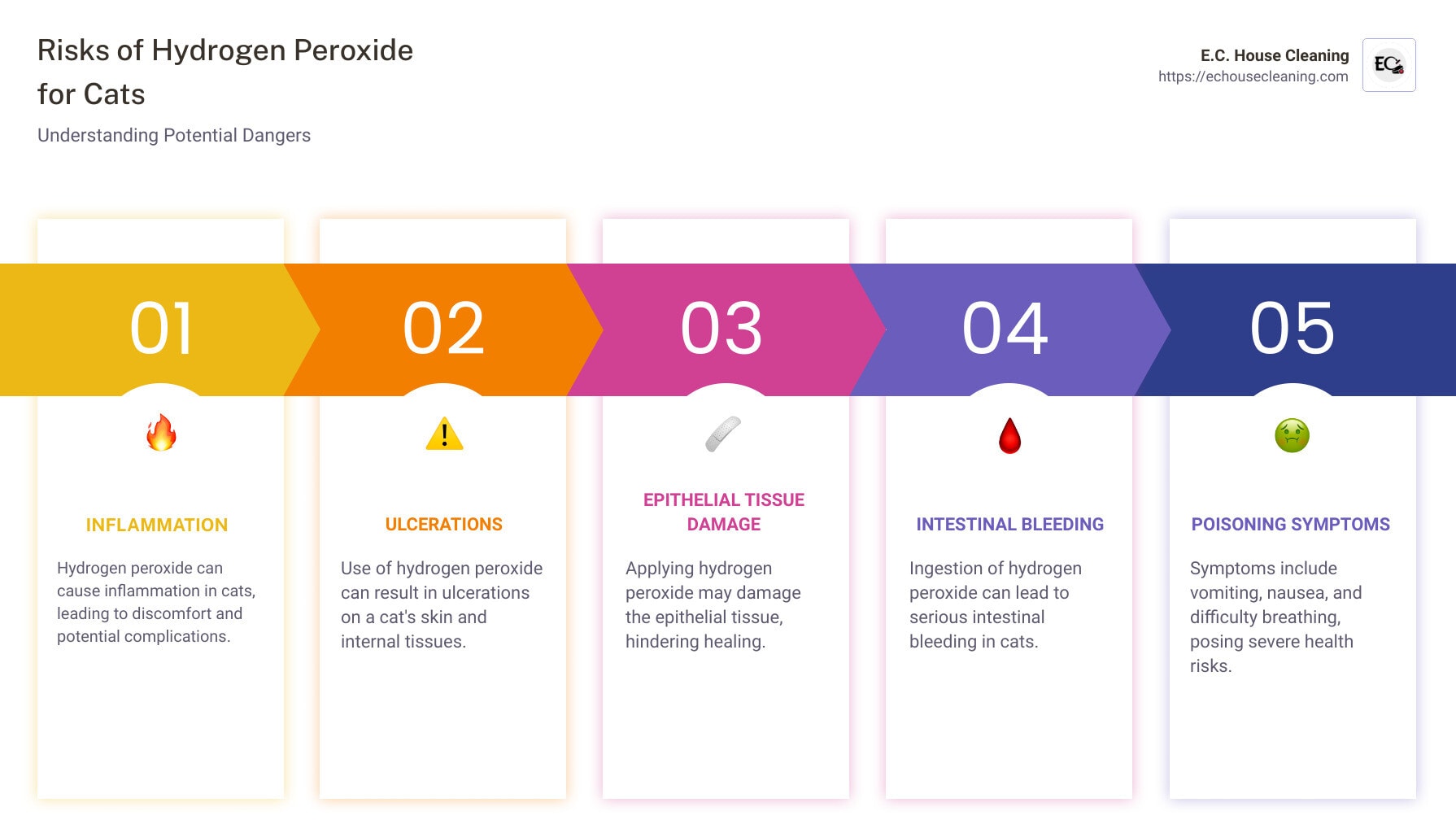
Table of Contents
What is Hydrogen Peroxide?
Hydrogen peroxide is a chemical compound made up of hydrogen and oxygen, commonly found in many households as a disinfectant and antiseptic.
It’s often used for cleaning wounds, oral hygiene, and even in some cleaning products.
In the realm of veterinary medicine, hydrogen peroxide is sometimes employed to induce vomiting in dogs. However, it’s crucial to understand that what works for dogs doesn’t necessarily work for cats.
Cats have a much more sensitive system, and using hydrogen peroxide on them can lead to severe stomach and esophagus issues. Therefore, it’s not recommended for feline use.
The Risks of Using Hydrogen Peroxide on Cats
Why Hydrogen Peroxide is Unsafe for Cats
Hydrogen peroxide might seem like a handy tool for cleaning and first aid, but it’s a hidden danger for cats. Even though it’s effective for some animals, cats’ bodies react very differently.
When applied to their skin or ingested, hydrogen peroxide can cause severe inflammation and ulcerations by damaging healthy skin cells.
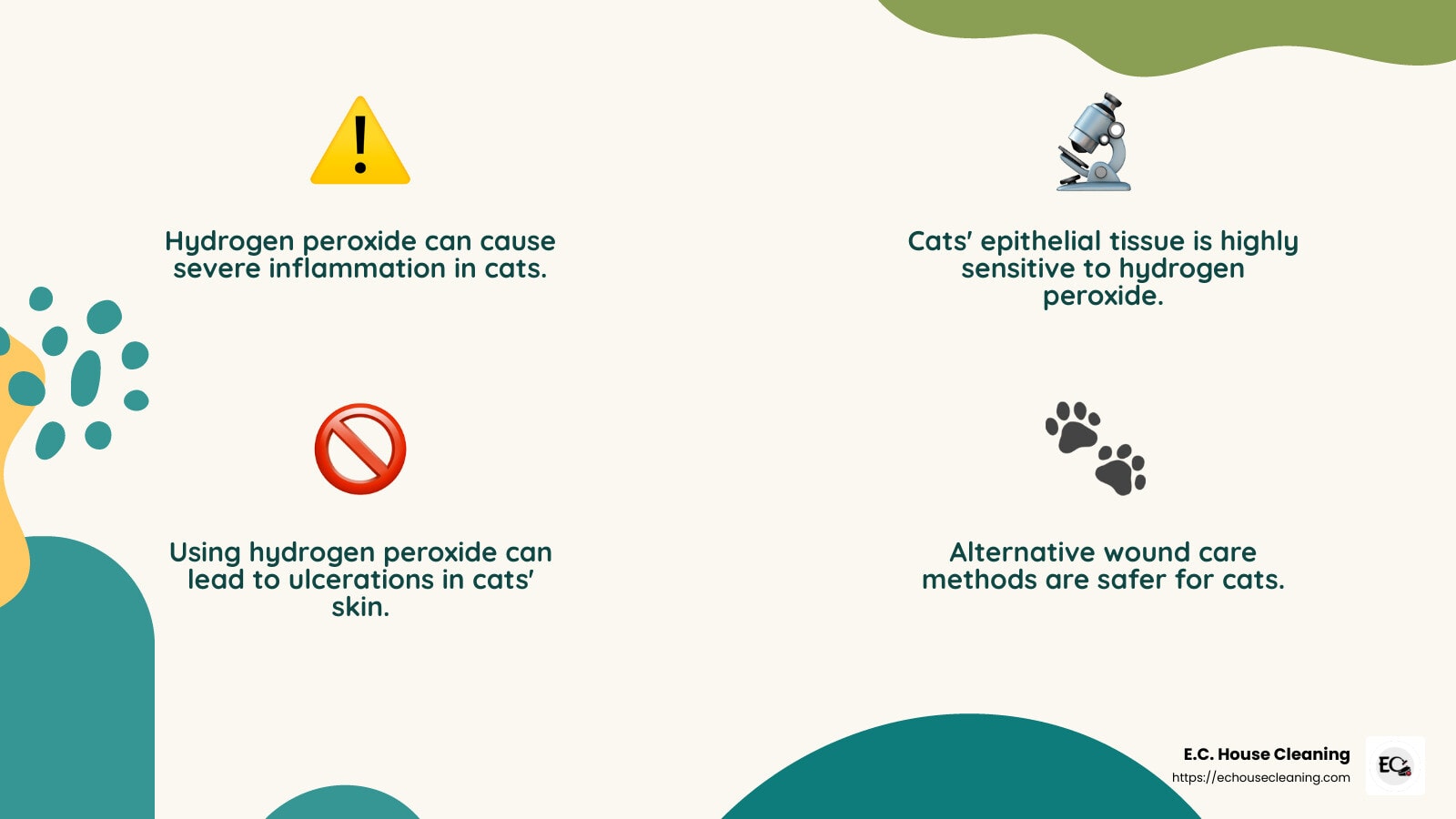
The substance can damage the delicate epithelial tissue inside your cat’s body. This damage can lead to intestinal bleeding and other serious health issues. Additionally, hydrogen peroxide can impair the natural healing process, making the skin more vulnerable to infections.
Cats are especially sensitive, and their internal systems can be harmed by substances that might seem harmless to us.
Symptoms of Hydrogen Peroxide Poisoning in Cats
If a cat is exposed to hydrogen peroxide, the consequences can be severe and sometimes fatal. Recognizing the symptoms early is crucial. Here are the common signs of hydrogen peroxide poisoning in cats:
- Vomiting: This is often the first noticeable symptom. It can be frequent and severe.
- Nausea: Your cat might appear uncomfortable and unwilling to eat.
- Bloody Stools: This indicates internal bleeding, a serious condition that requires immediate attention.
- Difficulty Breathing: This is a critical symptom and can indicate severe internal issues.
- Foaming at the Mouth: This might occur shortly after exposure and is a clear sign of distress.
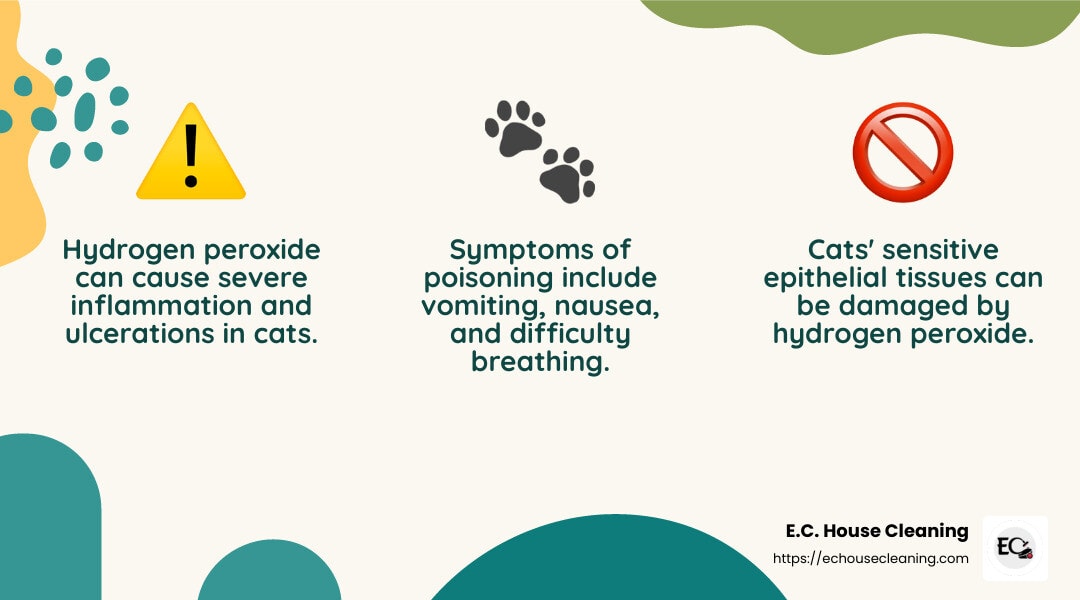
These symptoms can escalate quickly, and it’s important to seek veterinary care immediately if you suspect your cat has been exposed to hydrogen peroxide.
Knowing the location of the nearest emergency vet can be crucial in such urgent situations. The damage is often internal, making it harder to notice until it’s too late.
In summary, is hydrogen peroxide safe for cats? Absolutely not. The risks far outweigh any potential benefits. Always opt for safer alternatives when caring for your feline friend.
Safe Alternatives for Wound Care in Cats
When it comes to caring for your cat’s wounds, it’s important to use methods that are both safe and effective.
Having well-stocked pet first aid kits is crucial for ensuring you have all the necessary supplies on hand, including saline solution for gentle wound flushing.
Hydrogen peroxide is not safe for cats, and using it on your pet’s wounds can pose significant risks. However, there are several alternatives that can help keep their wounds clean and promote healing without causing harm.
Pressurized Saline for Initial Flushing
One of the best ways to clean a wound is by using a saline solution. Saline is gentle and matches the pH of your cat’s skin, which means it won’t sting or irritate the wound.
You can make a simple saline solution at home by dissolving ½ teaspoon of salt in 1 cup of boiling water. Let it cool, and then use it to flush the wound.
For a more convenient option, consider using Arm & Hammer Simply Saline or a saline eyewash. These products are easy to use and effective for initial wound cleaning. They help remove dirt and debris, creating a clean surface for further treatment.
When to Use Mild Soap
In some cases, mild soap can be used to clean areas around the wound, especially if there’s grease or oil present. Dawn soap is a good choice for this task. Before applying soap, protect the wound by covering it with sterile water-soluble lube and a vet wrap. This prevents soap from irritating the wound itself.
After cleaning with soap, make sure to thoroughly rinse the area with saline solution to remove any soap residue. This extra step ensures the wound remains clean and irritation-free.
Other Safe Alternatives for Your Pet First Aid Kit
Aside from saline and mild soap, there are other safe options for wound care:
- Chlorhexidine: A disinfectant that needs to be diluted before use. It’s effective for killing bacteria without harming your cat’s skin.
- Pet-safe antimicrobial ointment: These ointments provide a protective layer over the wound and help prevent infection.
When caring for your cat’s wounds, always choose products that are specifically labeled as safe for pets. This ensures you’re not inadvertently using something harmful.
Using these safe alternatives will help keep your cat’s wounds clean and aid in a quicker recovery.
Next, we’ll cover how to properly induce vomiting in cats if they ingest something harmful.
The Correct Way to Induce Vomiting in Cats
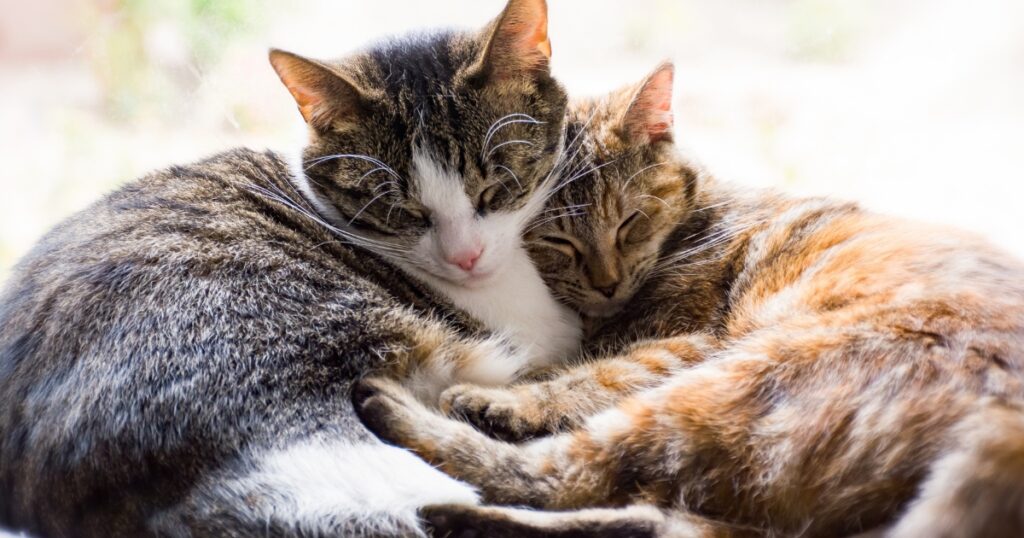
If your cat ingested something harmful, your first instinct might be to induce vomiting. However, it’s crucial to consult a veterinarian before taking any action.
Hydrogen peroxide, which is sometimes used for dogs, is not safe for cats and can cause severe harm.
Contact a Veterinarian First
Before attempting any action, contact your veterinarian immediately. They are the best resource for advice custom to your cat’s specific situation. If your vet isn’t available, reach out to the Pet Poison Helpline® for guidance. They can provide expert advice on what steps to take next.
Avoid Home Remedies
You might be tempted to try home remedies to make your cat vomit, but this can be dangerous. Unlike dogs, inducing vomiting in cats is not straightforward and should never be attempted without professional guidance.
Hydrogen peroxide is not safe for cats and can lead to complications like intestinal bleeding.
Importance of Veterinary Advice
Veterinary advice is critical when dealing with potential poisoning. Vets can assess the situation and determine the best course of action. They might use medications that are safe for inducing vomiting in cats, but these are not available for home use.
Hydrogen Peroxide Dosage for Dogs (Not for Cats)
While hydrogen peroxide is sometimes used to induce vomiting in dogs, it is not safe for cats. For dogs, the dosage is typically 1 teaspoon per 10 pounds of body weight, but this is strictly under veterinary guidance. Attempting to use this method on cats can result in severe health issues.
Risks of Self-Treatment
Self-treating your cat without professional input can lead to serious health risks, including damage to the stomach and esophagus. Always remember that what works for one pet may not be suitable for another. Cats have unique physiology and require specific care.
In summary, if your cat ingests something toxic, contact a veterinarian or the Pet Poison Helpline® right away. Avoid home remedies, and never use hydrogen peroxide on cats. Veterinary guidance is essential to ensure your cat’s safety and health.
Next, we’ll discuss how to monitor your pet’s healing process effectively.
How to Administer Hydrogen Peroxide to Induce Vomiting
If your veterinarian advises you to induce vomiting in your dog using hydrogen peroxide, it’s vital to follow their instructions meticulously. The standard dosage is typically 1 teaspoon of 3% hydrogen peroxide per 10 pounds of body weight, administered orally.
However, inducing vomiting can sometimes be more dangerous than the substance ingested, so it’s essential to consult with a veterinarian, animal emergency room, or pet poison control hotline before attempting this.
Always prioritize professional guidance to ensure the safety and well-being of your pet.
Alternatives to Hydrogen Peroxide for Inducing Vomiting
When hydrogen peroxide is not recommended or effective, veterinarians may suggest other methods to induce vomiting. Common alternatives include medications like apomorphine or xylazine, which are specifically used in veterinary medicine as emetics.
These alternatives are generally safer and more effective under professional supervision.
It’s crucial to follow your veterinarian’s instructions precisely, as improper administration can lead to serious health risks. Always rely on professional advice to handle such delicate situations.
Monitoring Your Pet’s Healing Process
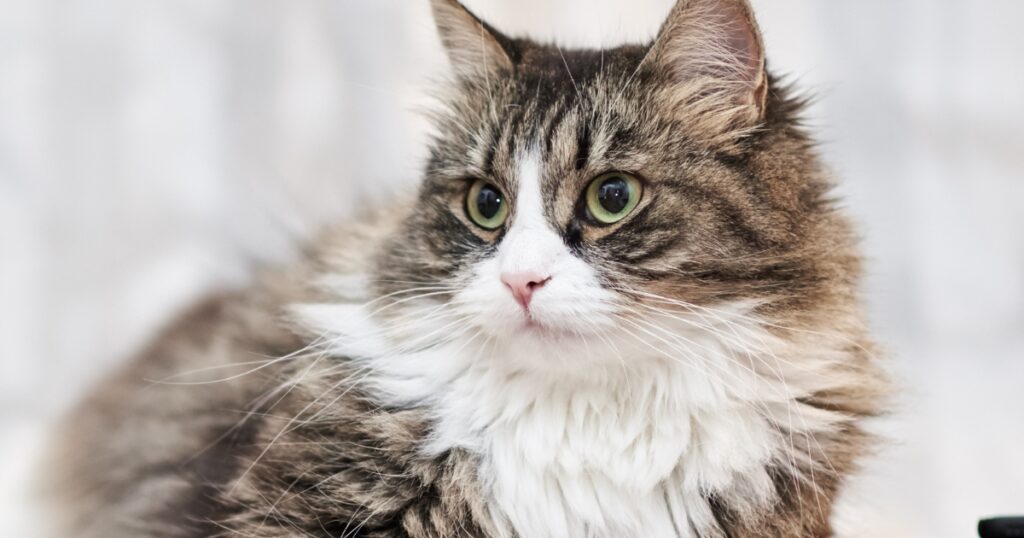
Keeping an eye on your pet’s wound healing is crucial. Knowing the signs of infection and understanding the healing indicators can make a big difference in your pet’s recovery.
How to Tell if Your Pet’s Wound is Infected
An infected wound is a serious concern. Here are key signs to watch for:
- Odor: If the wound emits a bad smell, it could be a sign of infection. This smell can range from mild to extremely foul.
- Pain: Increased sensitivity or pain when touching the wound may indicate infection. Your pet might react by pulling away or showing discomfort.
- Discharge: Look for unusual discharge. Yellowish, greenish, or grayish discharge suggests infection and needs immediate attention.
If you notice any of these signs, contact your veterinarian as soon as possible. Early intervention is crucial for preventing complications.
How to Tell if Your Pet’s Wound is Healing
A healing wound shows clear signs of progress. Here’s what to look for:
- Clean Incision: If the wound was closed surgically, the incision should appear clean. Redness will fade, and swelling should gradually decrease.
- Granulation Tissue: This is a good sign in open wounds. It appears as healthy pink tissue and indicates that the body is rebuilding tissue.
- Wound Contracture: The wound should get smaller over time. This shrinking is a positive sign that the healing process is on track.
Healing takes time, and the timeline can vary. A fresh, properly treated wound may heal in about two weeks. Older or more severe wounds can take longer, sometimes up to two months or more.
Monitoring these signs closely will help you ensure your pet’s wound is healing properly. If anything seems off, don’t hesitate to consult your vet.
Next, we’ll dive into common questions about hydrogen peroxide and cats.
Precautions When Using Hydrogen Peroxide on Cats
Using hydrogen peroxide on cats is highly discouraged without veterinary guidance. Cats are particularly sensitive to hydrogen peroxide, which can cause significant stomach and esophagus issues. Moreover, it’s not an effective emetic for felines.
If your cat ingests a toxic substance, seek emergency veterinary care immediately. Your veterinarian may recommend alternative methods for inducing vomiting or treating the toxicity.
Following their instructions carefully is essential to ensure your cat’s safety and well-being. Always prioritize professional advice over home remedies to protect your feline friend.
Conclusion
When it comes to caring for our feline friends, prioritizing pet safety is crucial. Hydrogen peroxide might be a household staple for humans, but it’s not safe for cats. Using it can lead to serious health issues, like tissue damage and poisoning.
Instead, rely on safer alternatives such as saline solutions and pet-safe antimicrobial ointments to keep your cat healthy and happy.
Consulting professionals is always a wise step. If you’re unsure about wound care or suspect your cat has ingested something harmful, reach out to your veterinarian or the Pet Poison Helpline®. They can offer expert advice and ensure your pet receives the best care possible.
Contact us today at E.C. House Cleaning, we are committed to the safety and well-being of your pets. We understand the importance of using eco-friendly and pet-friendly cleaning products in your home.
Our cleaning services prioritize not just cleanliness but also the health of your furry companions. If you’re interested in maintaining a clean and safe environment for your pets, explore our eco-friendly cleaning solutions today.
Keeping your cat safe is about making informed choices. By understanding the risks and consulting with professionals, you can ensure a loving and safe home for your feline family members.
Frequently Asked Questions about Hydrogen Peroxide and Cats
Can I use hydrogen peroxide to clean my cat’s wound?
No, you should not use hydrogen peroxide to clean your cat’s wound. While it might seem like a good idea because it’s commonly used for humans, hydrogen peroxide can actually cause harm to your cat.
It is abrasive and can damage the tissue around the wound, slowing down the healing process.
Instead, opt for safer alternatives like a saline solution or a disinfectant such as chlorhexidine. These options are much gentler on your cat’s sensitive skin and promote better healing.
What should I do if my cat ingests hydrogen peroxide?
If your cat ingests hydrogen peroxide, it’s important to act quickly. Unlike dogs, cats can suffer from irritation and even intestinal bleeding from ingesting hydrogen peroxide.
Do not attempt to induce vomiting at home.
Immediately contact your veterinarian or the Pet Poison Helpline® at (855) 764-7661 for professional advice. Caution against using tea tree oil as it can be harmful to cats, causing burns, skin irritation, and potentially containing toxic ingredients that hinder healing.
They can guide you on the next steps to ensure your cat receives the proper care.
Are there any safe alternatives to hydrogen peroxide for cat wound care?
Yes, there are several safe alternatives to hydrogen peroxide for treating your cat’s wound. Saline solution is an excellent choice for initial wound flushing as it is gentle and non-irritating. You can use a pressurized saline spray like Arm & Hammer Simply Saline or even a simple saline eyewash.
For disinfecting, chlorhexidine is a great option, but remember to dilute it as per the instructions to avoid tissue damage. Additionally, a pet-safe antimicrobial ointment can help protect the wound from infection while promoting healing.
Always follow your vet’s advice on the best products for your cat’s specific needs.
If you have more questions about wound care or need specific advice, don’t hesitate to reach out to your veterinarian. They can provide custom guidance to ensure your cat’s health and safety.
Our Content
All content is written by E.C. House Cleaning’s professional cleaning company. We put our expertise in house cleaning services into each piece of content, focusing on providing valuable, accurate, and relevant information. With over 20 years of deep, full cleaning service industry experience in the Massachusetts and Boston area with a proven track record of pet-friendly house cleaning services in Massachusetts, commercial office cleaning Boston, and trust for customers as signaled by our hundreds of 5-star reviews, E.C. House Cleaning is an authority on residential and commercial cleaning services.
